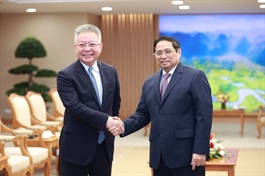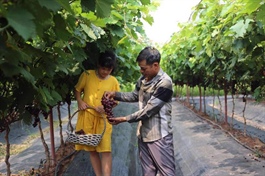Vietnamese exports must meet sustainable development standards: conference
Vietnamese exports must meet sustainable development standards: conference
Vietnamese could do well in foreign markets, but first they must meet sustainable development requirements, quality standards, and pricing expectations, representatives from large foreign distributors said at a conference on Wednesday.

The conference, hosted by the Ministry of Industry and Trade, was held to discuss the implementation of the prime minister’s resolution to boost the entry of Vietnamese enterprises in foreign distribution networks until 2030.
Representatives from large foreign distributors used the conference as a platform to advise Vietnamese exporters that they must ensure the volume, quality, and pricing of their products, as well as meet all environmental protection requirements.
Regarding sustainable development criteria, Yuichiro Shiotani, general manager of Aeon Topvalu Vietnam, shared that his company imports tens of thousands of fresh bananas valued at a combined US$100 million each year.
However, nearly 70 percent of Aeon Topvalu’s total volume of bananas came from the Philippines, where pricing and quality were more stable.
Aeon entered into a memorandum of understanding with the Vietnamese Ministry of Industry and Trade in 2018 to import fresh Vietnamese bananas to Japan.
Last year, the proportion of fresh Vietnamese banana exports to Japan has surged to over half of the country’s total banana imports.
“We choose suppliers with a circular production model. Our suppliers, besides cultivating banana trees, are farming seafood and breeding cows.
“Livestock waste is used to fertilize banana trees and bananas unqualified for export are used as feed for cattle. There is almost no waste, so we hope that model spreads,” Shiotani explained.
In addition to quality and pricing, suppliers must meet sustainable development and environmental protection requirements if they want their products on foreign shelves.
Similarly, Aly Ansari, a senior director at Walmart Global Sourcing, said the impact of the COVID-19 pandemic, as well as political tensions, have caused distributors to change their strategies. They have expanded their supplier networks in order to reduce their reliance on certain markets.
However, Ansari noted that Walmart prefers suppliers which focus on sustainable development, in addition to quality and pricing.
“We prefer products made by virtuous suppliers that pay fair salaries to workers and appreciate their laborers’ dignity.
“Agricultural products must meet food safety standards. If Vietnam employs climate change adaptation solutions in farming, its agro-fishery products will get the priority,” Ansari said.
Pledging support
Sale through cross-border e-commerce platforms plays a major role in exporting Vietnamese goods through foreign distributors.
Do Hong Hanh from Amazon Global Selling Vietnam said Vietnam’s exports through Amazon soared 80 percent last year, mainly through products produced by small and medium enterprises.
In particular, nearly 10 million Vietnamese products were exported via e-commerce platforms, with the export value rising 45 percent over the previous year. These products were mainly household utensils, garments, healthcare products, and consumer goods.
Do Thang Hai, Deputy Minister of Industry and Trade, said that high-quality products from Vietnam, such as agricultural products, food, household utensils, garments, footwear, and furniture, have been provided to millions of consumers through international distribution systems.
As foreign retail groups have become effective and sustainable export channels, it has become necessary to promote the distribution of Vietnamese goods to foreign markets in a bid to support local enterprises hoping to participate in global production, supply, and distribution chains, as well as exploit the competitive advantages of Vietnamese exports.
The Ministry of Industry and Trade will develop a network of strategic partners from the project, particularly inclusive of retailers who operating in Vietnam or seek to shift their supply chains to the Vietnamese market.
The ministry will also enhance cooperation with localities and associations in order to select core enterprises to support the implementation of the project, as well as study, develop and propose appropriate policies to encourage Vietnamese enterprises to directly export their products.
“We will support Vietnamese enterprises in selling goods on e-commerce platforms and call on banks to support exporting enterprises with various financial solutions,” Hai added.
























